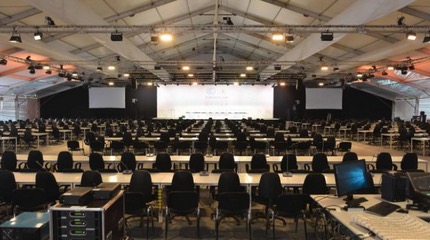 On the eve of the U.S. elections, a number of pundits and leaders—including Pope Francis—continue to warn Americans against an undefined “politics of fear,” while simultaneously spreading the fear of the nebulous enemy of “global warming.”
On the eve of the U.S. elections, a number of pundits and leaders—including Pope Francis—continue to warn Americans against an undefined “politics of fear,” while simultaneously spreading the fear of the nebulous enemy of “global warming.”
In a speech delivered at the Vatican Saturday, Pope Francis denounced making political decisions based on fear, because fear “weakens and destabilizes us, destroys our psychological and spiritual defenses, and numbs us to the suffering of others,” he said.
“No tyranny can be sustained without exploiting our fears,” he said.
Meanwhile, fantastical reports emerge every day stoking fears of climate change and attributing every possible ill to a supposed evil that none truly understands.
On the same day of the Pope’s Vatican speech, the online journal Business Insider ran an ominous scare piece titled “7 foods that could go extinct thanks to climate change,” which threatened that global warming is “endangering some of the most popular and delicious foods on the planet.”
“Here are seven foods and drinks that could grow more expensive and eventually disappear due to climate change,” the essay confidently announced: avocados, coffee, beer, oysters, maple syrup, chocolate and lobsters.
If telling people they will have no more chocolate or beer if they don’t approve climate change agreements doesn’t constitute the lowest form of fear-mongering, it would be tough to find an example that does.
Moreover, the article fails to mention that global warming scares are routinely debunked almost as soon as they are propagated.
To take just one example from the Business Insider article itself: the supposed extinction of coffee.
“In September, a report from the nonprofit Climate Institute concluded that the area around the world fit for coffee production would decrease by 50% due to climate change,” the essay declared.
Already, “climate change has made coffee crops more vulnerable to diseases like coffee rust, which have wiped out more than a billion dollars in crops,” it said.
The problem with these claims? They are completely false.
What the article failed to mention was that just a month after the Climate Institute story, a group of researchers from the University of Exeter released a comprehensive study on coffee and climate change, asserting that the supposed connection between the world’s coffee supply and “climate change” was completely baseless.
Although mainstream media reports, including newspapers such as the New York Times, have linked coffee production with climate change, the scientists said they found “no evidence” for this, leading them to “reject the climate change hypothesis.”
The researchers published their findings in Philosophical Transactions of the Royal Society B, in which they conclude:
“We find no evidence for an overall trend in disease risk in coffee-growing regions of Colombia from 1990 to 2015, therefore, while weather conditions were more conducive to disease outbreaks from 2008 to 2011, we reject the climate change hypothesis.”
















